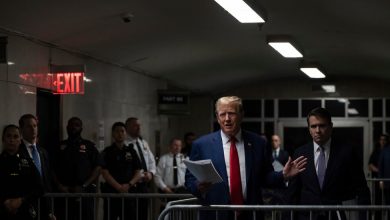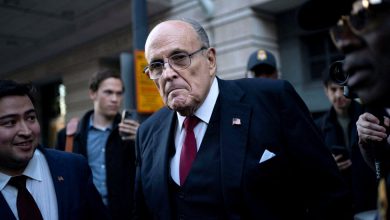Hochul Could Face Battle With Fellow Democrats Over Corporate Tax Increase

ALBANY, N.Y. — Two years ago, progressive state lawmakers in New York successfully pushed to increase taxes on the superrich and corporations as a way to spend more on public education and fund pandemic relief programs.
Now, with the tax increase on large corporations expiring at the end of the year, left-leaning lawmakers and activists have mounted a renewed effort to make the higher corporate tax rate permanent.
But that may very well put them at odds with Gov. Kathy Hochul, a moderate Democrat who has warned against raising taxes after winning a tight election last year on a pledge to make New York more affordable, fiscally responsible and economically competitive.
Ms. Hochul has not taken a stance on the emerging corporate tax debate, but that is expected to change on Wednesday when she unveils her proposal for the state budget, kicking off the annual negotiations between governor and lawmakers over how to spend over $200 billion in state resources.
The corporate tax is but one of a plethora of policy issues that could expose ideological divides and power struggles between the governor, who is looking to establish her place in Albany after winning her first full term, and Democrats in control of the State Legislature, who have already successfully challenged her this year.
A Senate committee rejected her nominee for chief judge two weeks ago, a stunning defeat that marked the first time a governor’s pick for New York’s highest court was rejected. The clash, currently at a standstill, may cast a shadow over the budget negotiations: The governor has insisted that her nominee must receive a full vote on the Senate floor and is considering suing her fellow Democrats to force a vote.
Ms. Hochul and the Legislature’s progressive wing may well spar over the level of spending on child care programs, housing and public schools during the budget process, a typically contentious affair that is expected to culminate by April 1.
But there are also nonfiscal issues that could play a divisive role.
The governor on Wednesday is expected to reveal the third round of revisions she wants to make to the state’s bail laws, a politically explosive issue that has for years divided Democrats in the State Capitol, pitting criminal justice reforms against fears over crime.
While governors tend to hold outsize power during the budget process, Ms. Hochul will enter the negotiations somewhat politically weakened, but perhaps also less inclined to compromise with lawmakers whom she may see as having crossed her.
State Senator Brad Hoylman-Sigal, a Democrat who chairs the judiciary committee, which blocked Ms. Hochul’s chief judge nomination, said lawmakers respected the governor’s role as the architect of the budget, but would fight her “professionally and respectfully” on the issues they disagreed on.
“I think there have been some lines drawn by progressive advocates on issues leading up to the budget,” said Mr. Hoylman-Sigal, who recently introduced a bill to make the corporate tax hike permanent. “So this will be a moment, I hope, where we can agree that the needs of New York are so great that we have to seek support from the richest people and corporations in order to address them.”
Ms. Hochul will also announce the nuts and bolts of her ambitious plan to ease the state’s housing crisis by constructing 800,000 new housing units over the next decade, an effort that could spark feuds with local governments, especially in the suburbs.
One proposal will direct towns and cities, including New York City, to loosen restrictions on home-building within a half-mile radius of train and subway stops, which state officials estimate could lead to 190,000 new homes being built.
Ms. Hochul also wants communities to expand their housing stock by set percentages — 3 percent over three years downstate, for example — or choose from a set of pro-housing policies, like repealing restrictive zoning rules. Not doing eitherrisks triggering a special process allowing developers to propose and build bigger buildings even without the communities’ approval. That plan could account for another 150,000 homes.
The governor has said that she wants to replace 421a, a contentious and now-expired tax break to incentivize developers of big apartment buildings in New York City to build more affordable housing. She will not, however, include a replacement program in her budget proposal, opting instead to work with state legislators on a new program after they defeated her proposal last year.
But Ms. Hochul will announce her intention to extend a deadline — from June 2026 to June 2030 — by which developments must be completed to benefit from the now-expired tax break. Industry groups had said that many projects, which might have otherwise qualified for the tax break, were in danger of not being built at all because they would not meet the deadline given the state of the debt market, contractor shortages and staffing problems in city agencies.
As for the debate over taxes, Andrea Stewart-Cousins, the Senate majority leader, suggested recently that she would gauge support within her conference once Ms. Hochul delineated her proposals.
While Ms. Hochul has said that she will not move to raise taxes, she has been less clear about her position on the corporate tax rate, which lawmakers increased in 2021 to 7.25 percent, up from 6.5 percent, for companies that make over $5 million in revenue. The increase, which overcame resistance from former Gov. Andrew M. Cuomo when he was mired in scandal, was enacted as a so-called surcharge that would expire after three years, on Dec. 31.
The governor’s office would not say if she supported extending the surcharge or letting it lapse as scheduled.
The corporate tax, which is expected to generate over $7 billion this fiscal year, is the state’s third largest source of tax revenue after the personal income tax, which is projected to bring in $70 billion, and sales and use taxes, estimated to raise over $17 billion.
When New York raised the corporate tax rate budget officials projected that the surcharge would generate an extra $750 million to $1.1 billion each year. On Tuesday, budget officials said that while corporate tax revenues had shot up, they could not determine how much of the increase was a result of the higher tax rate.
But the Fiscal Policy Institute, a liberal-leaning think tank, estimated that if New York lets the corporate tax rate return to 6.5 percent as scheduled, the state could lose out on $1.5 billion in tax revenue by the end of fiscal year 2025, according to an analysis of public budget data.
Covering a potential $1.5 billion loss, experts said, would not be terribly complicated for a state with a $220 billion budget and in relatively stable financial condition. Even with the pandemic-era influx of federal funds steadily drying up, the state has so far collected nearly $7.7 billion more in tax revenue than originally projected this fiscal year, and Ms. Hochul has significantly increased the state’s so-called rainy day fund.
But some lawmakers and a coalition of progressive activist groups have mobilized to extend the higher corporate tax rate and enact a slate of new tax increases on the superrich to fund a sweeping agenda of left-wing policy priorities, such as universal child care, and making public colleges tuition free for state residents.
“We’ve seen the state Legislature stand up to governors, including this one, so there’s a path here to get this done,” said Carolyn Martinez-Class, the campaign manager for Invest in Our NY, the coalition calling for higher taxes.
They have pitched the tax increases as an alternative to some of Ms. Hochul’s most contentious proposals, including her plan to increase tuition for both the State University of New York and the City University of New York systems — a move decried by student leaders. The push for additional revenue also comes at a time when the Metropolitan Transportation Authority, which the governor effectively controls, is facing a $600 million deficit, and is considering raising subway fares to over $3.
New York’s corporate tax rate is lower than those in neighboring states, such as New Jersey (11.5 percent) and Pennsylvania (8.99 percent). But companies that do business in the New York City region face the highest effective tax rate in the nation — about 16 percent — when taking into account the city’s corporate tax rate and a surcharge from the Metropolitan Transportation Authority, according to a 2020 study from the Citizens Budget Commission.
“Solving a budget problems in a way that drives business out of the state is not a good solution,” said Andrew Rein, the president of the commission, a watchdog that pushes for fiscal restraint and opposes extending the corporate tax surcharge.
Mihir Zaveri contributed reporting.




